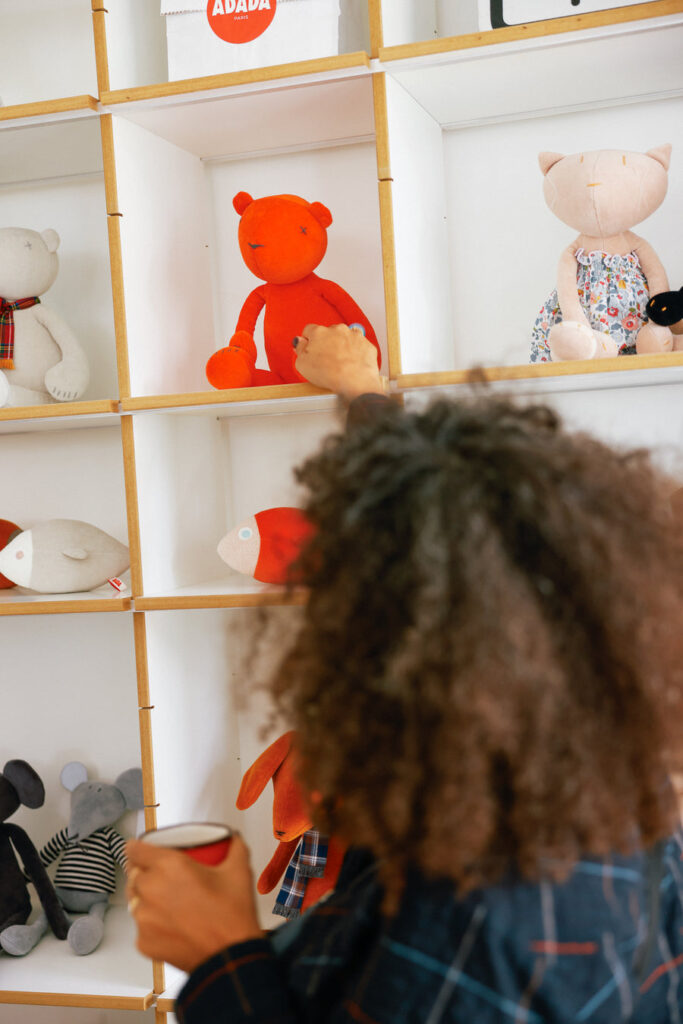Since its inception in 2020, Adada has redefined the art of toy-making. Based in France, Adada is more than just a brand producing high-quality toys; it is a brand that merges playfulness with sophisticated design, bringing joy to children while enhancing the aesthetic appeal of homes. Led by the visionary interior designer Véronique Lacaze, Adada approaches toy design with a unique perspective, viewing each piece as an artful blend of form and function, inspired by the clean lines and modern sensibilities of the Bauhaus movement. With inspirations from architectural icons like Le Corbusier, Saarinen, and Eames, each toy is not only a source of delight for children but also a stylish accent for any interior.
Adada’s commitment to craftsmanship is evident in every product it creates. Each toy is meticulously designed with precision and attention to detail, resulting in items that are both durable and beautiful. Rather than mass-produced pieces, Adada’s toys feel like individual works of art, crafted by skilled artisans who understand the importance of detail. The brand’s commitment to quality is palpable; each toy is made with high-quality materials, chosen for their durability and visual appeal. This attention to craftsmanship ensures that Adada’s products are built to last, withstanding the rigors of playtime while maintaining their pristine aesthetic over time.
But the commitment to quality doesn’t stop at durability. Adada’s toys are thoughtfully designed to integrate seamlessly into the modern home. These toys are more than just playthings—they are accent pieces that complement contemporary interiors. Their clean lines, subtle color palettes, and sophisticated forms make them ideal additions to any space, whether displayed on a shelf, in a playroom, or as part of a curated living area. By treating toys as pieces of functional decor, Adada has created a product line that appeals to design-conscious parents who want to create beautiful, cohesive living spaces without compromising on playfulness.
One of the defining characteristics of Adada’s design philosophy is its homage to the Bauhaus movement. The Bauhaus school, founded in Germany in the early 20th century, revolutionized design by advocating for simplicity, functionality, and a harmonious relationship between art and industry. This philosophy resonates deeply in Adada’s work, which emphasizes clean lines, practical forms, and a balanced aesthetic. Adada’s toys are a contemporary nod to Bauhaus principles, demonstrating that simplicity can be both elegant and engaging.
In addition to Bauhaus, Adada draws inspiration from iconic designers like Le Corbusier, Saarinen, and Eames. These architects and designers were pioneers of modernism, transforming the way we think about space, form, and functionality. Adada’s toys reflect the same spirit, featuring smooth curves, structural integrity, and minimalistic designs that align with the functional beauty celebrated by these design legends. By incorporating these influences, Adada’s products stand out in the world of children’s toys, bringing a level of sophistication that feels fresh and timeless.
For instance, Le Corbusier’s modular approach to design can be seen in Adada’s toys, which often feature interlocking pieces and structures that encourage creative assembly and exploration. Saarinen’s emphasis on organic shapes is echoed in Adada’s use of curves and rounded forms, which are not only visually appealing but also child-friendly. Eames’ playful yet refined approach is also present, with toys that balance whimsy with a design-driven aesthetic. Each Adada toy embodies these design philosophies, creating a bridge between playful expression and refined taste.
Since its founding, Adada has expanded rapidly, capturing the attention of families around the world. From the United States to Europe and Japan, Adada toys have become a favorite for those seeking a blend of quality, style, and functionality. This international success speaks to the universal appeal of Adada’s approach: high-quality toys that are thoughtfully designed to bring joy to children while also enhancing the living spaces they occupy. In a world where many children’s products are brightly colored and plastic-laden, Adada stands out for its sophisticated, natural look, offering an aesthetic alternative that appeals to a global audience.
Adada’s toys resonate with families who appreciate design and want to instill a love for well-made, beautiful objects in their children from a young age. Each piece is carefully crafted to be engaging for kids without overwhelming the design of a room, making Adada a unique addition to any household. The brand’s success in diverse markets speaks to a shift in consumer priorities—parents increasingly value products that are sustainable, well-designed, and versatile enough to grow with their children and complement their homes.
Adada’s toys are often described as “functional decor,” a term that perfectly encapsulates the brand’s mission. These toys go beyond their role as playthings, serving as decorative accents that add warmth and personality to a space. For parents who appreciate minimalist interiors and value the importance of a cohesive design, Adada’s toys offer an appealing solution. By creating toys that blend seamlessly into the home, Adada helps families create spaces that are both child-friendly and stylish, proving that beauty and functionality can coexist.
Beyond their aesthetic appeal, Adada’s toys are designed to stimulate children’s creativity and imagination. Each piece encourages exploration, problem-solving, and open-ended play, fostering cognitive development in a way that is natural and enjoyable. The brand’s dedication to creating toys that are both visually and intellectually stimulating reflects a commitment to enriching the lives of children and parents alike. In this way, Adada’s toys are not only beautiful objects but also valuable tools for learning and growth.
As Adada continues to grow, the brand remains committed to its founding principles of quality, craftsmanship, and design excellence. With an increasing demand for thoughtfully designed children’s products, Adada is well-positioned to expand its reach and bring its vision to more homes around the world. The brand’s success thus far is a testament to the power of innovation, as well as the timeless appeal of high-quality, aesthetically pleasing products that serve a dual purpose.
Looking ahead, Adada is likely to continue pushing the boundaries of what children’s toys can be. With a focus on sustainable materials and eco-friendly practices, the brand is also responding to a growing consumer demand for products that are both beautiful and ethically made. This commitment to sustainability, combined with its unique design approach, positions Adada as a forward-thinking brand that is setting new standards in the industry.
In a short period, Adada has managed to carve out a unique niche in the world of children’s products, creating toys that are both functional and beautiful. By embracing the principles of Bauhaus and drawing inspiration from modernist architects, the brand has redefined what toys can be, transforming them into timeless pieces that add value to any home. Adada’s toys are more than mere objects; they are symbols of a new approach to design, one that values both joy and style.
For families who believe that every object in their home should be thoughtfully designed and purposefully crafted, Adada is a brand that resonates deeply. Each toy is a reflection of the brand’s commitment to quality and design, offering a unique blend of playfulness and sophistication. As Adada continues to grow and inspire, it reminds us that beauty and functionality can indeed go hand in hand, and that even the simplest objects—like a child’s toy—can have the power to elevate a space and bring joy to those who use it.
No comments yet.








